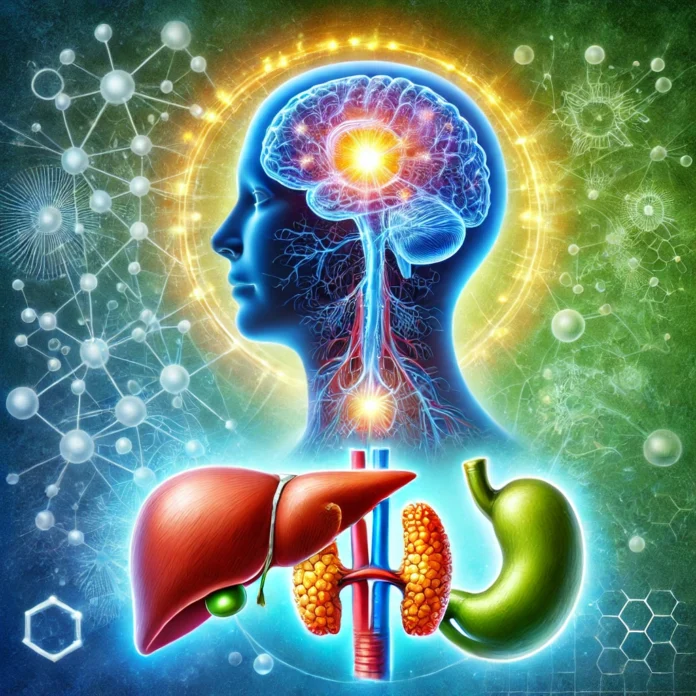The intricate relationship between the thyroid, liver, and brain is a fascinating area of medical science. Recent research highlights how thyroid and liver proteins play crucial roles in maintaining brain health and potentially offer new avenues for treating neurodegenerative diseases like Alzheimer’s. In this article, we’ll explore how these essential organs and their proteins contribute to cognitive well-being and discuss the implications for managing Alzheimer’s disease.
The Role of Thyroid in Brain Health
The thyroid gland, a butterfly-shaped organ located in the neck, produces hormones that regulate metabolism, energy levels, and brain function. Thyroid hormones such as thyroxine (T4) and triiodothyronine (T3) are essential for the development and maintenance of the central nervous system.
How Thyroid Hormones Support Brain Function:
- Neurodevelopment: During fetal and early childhood development, thyroid hormones are critical for neuronal growth, synapse formation, and myelination.
- Cognition and Mood Regulation: Adequate levels of thyroid hormones are linked to better memory, concentration, and emotional stability.
- Neuroprotection: These hormones help reduce oxidative stress and inflammation in brain cells, protecting against age-related cognitive decline.
Imbalances in thyroid function, such as hypothyroidism or hyperthyroidism, can lead to cognitive impairments, mood disorders, and an increased risk of neurodegenerative conditions.
Liver Proteins: A Hidden Gem in Brain Health
The liver, often referred to as the body’s detox powerhouse, also plays a surprising role in brain health. Liver-derived proteins such as insulin-like growth factor 1 (IGF-1) and certain transport proteins contribute to neurological well-being.
Key Contributions of Liver Proteins:
- Nutrient Regulation: The liver ensures a steady supply of glucose and essential nutrients to the brain, which is crucial for optimal function.
- Blood-Brain Barrier Maintenance: Liver proteins support the integrity of the blood-brain barrier, a protective shield that prevents harmful substances from entering the brain.
- Amyloid Clearance: Emerging studies suggest that the liver aids in the removal of amyloid-beta, a protein associated with Alzheimer’s disease, reducing its accumulation in the brain.
Thyroid and Liver Interplay in Alzheimer’s Treatment
Alzheimer’s disease, characterized by memory loss and cognitive decline, has been a challenging condition to treat. The interplay between thyroid hormones and liver proteins offers promising insights into potential therapeutic strategies.
Mechanisms of Action:
- Reducing Inflammation: Thyroid hormones and liver proteins collectively mitigate chronic inflammation, a key contributor to Alzheimer’s progression.
- Enhancing Neural Repair: IGF-1 from the liver, in conjunction with thyroid hormones, promotes neuronal repair and regeneration.
- Amyloid-Beta Management: Liver-assisted clearance of amyloid-beta, combined with the neuroprotective effects of thyroid hormones, may slow disease progression.
Practical Implications for Health and Wellness
Maintaining optimal thyroid and liver health can have profound effects on brain function. Here are some actionable tips:
- Balanced Diet: Consume foods rich in iodine, selenium, and zinc for thyroid health, and prioritize liver-friendly foods like leafy greens, fatty fish, and nuts.
- Regular Exercise: Physical activity enhances both thyroid function and liver efficiency, contributing to better brain health.
- Medical Check-ups: Regular screening for thyroid hormone levels and liver function can help detect and address imbalances early.
- Cognitive Activities: Engage in brain-stimulating activities to complement the biological benefits of thyroid and liver health.
Conclusion
The interconnected roles of the thyroid and liver in supporting brain health underscore the importance of a holistic approach to wellness. By understanding and nurturing these vital organs, we can pave the way for better cognitive function and potentially groundbreaking treatments for Alzheimer’s disease. As research continues, the hope of unlocking new therapeutic avenues grows brighter, offering promise for millions affected by neurodegenerative conditions.
